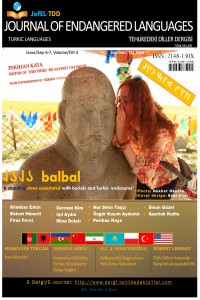Abstract
The Gagauzians are one of the nations being on their way to assimilation though they have schools, text-books, newspapers, journals, radio and TV stations, universities in their own language and get educated in mother tongue. As the result of assimilation policy during Russian occupation most of the people living in the cities or in the regions where other nations as well resided or the ones who were forced to settle in any region of the old Soviets speak Russian. The young Gagauzian generation who live in the Republic of Kazakhstan, North Caucasus, Bulgaria, Romania, Greece, Turkey and America can not speak their mother language. The children of the Gagauzians who were exiled during the years 1946-48 or who came to Azerbaijan to escape famine have almost lost their mother language. As a result of Russian assimilation policy, they had to communicate with the local people of Azerbaijan, Kazakhstan, Uzbekistan in Russian. However they belonged to the same language group. The sources denote that the Gagauzians had been living in the North Caucasus long before the exile and migration of 1946-48’s. Later sources provide us with little information about their fate. The Caucasus still reminds of the museum of languages, nations and ethnic groups. Every morning a radio station in the Republic of Dagestan which belongs to Russian Federation greets the nations and ethnic groups in 32 languages and dialects. The number of nations and ethnic groups living in the region was prevailing in the Middle Ages. As the times passed some of the nations and ethnic groups exterminated. One of such nations is the Gagauzians. Though they exterminated they live in the toponyms, hydronimes and on people’s memories.
Keywords
Gagauzians in Azerbaijan Caucasian nations Pir of Komrat baba Bucak communities and villages
References
- -
Details
| Primary Language | Turkish |
|---|---|
| Subjects | Linguistics |
| Journal Section | Articles |
| Authors | |
| Publication Date | December 15, 2015 |
| Submission Date | July 18, 2015 |
| Published in Issue | Year 2015 Volume: 4 Issue: 6-7 |


